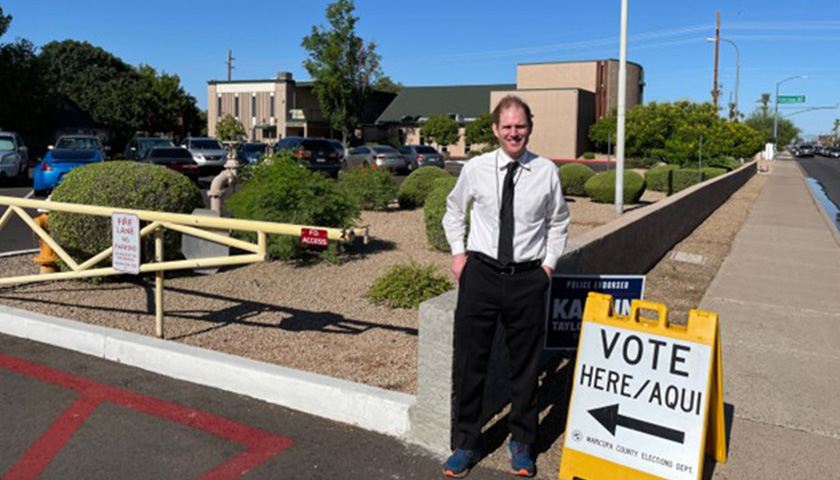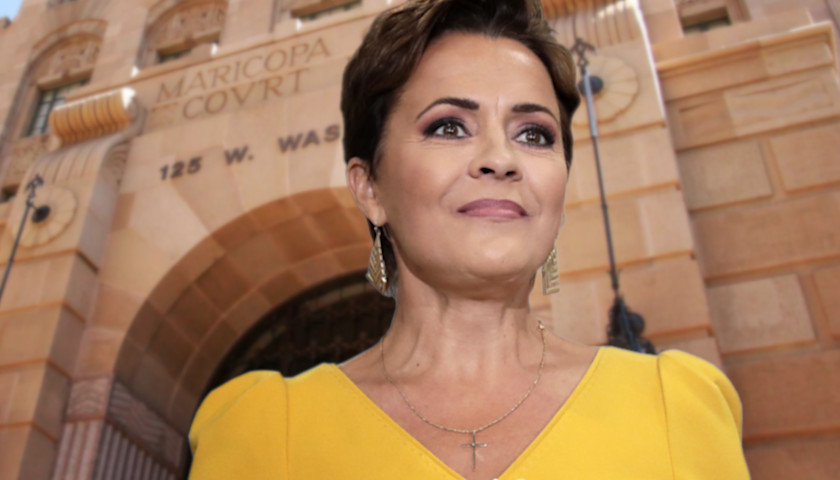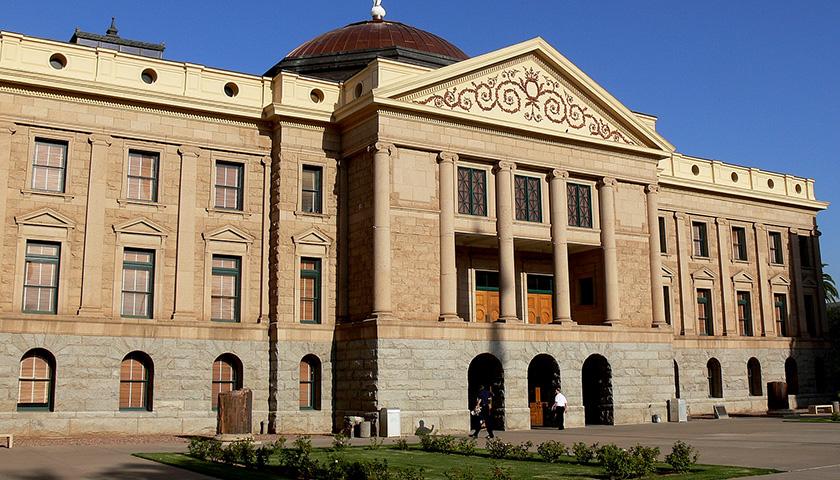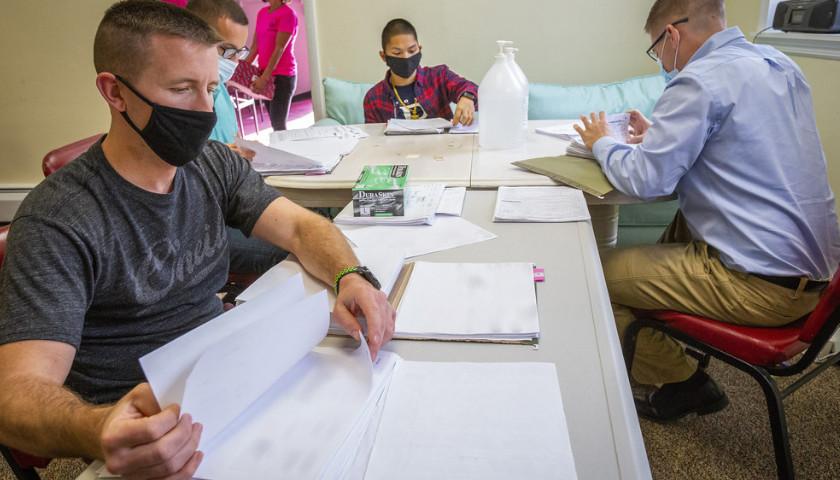The Arizona Supreme Court has placed a defamation lawsuit that Maricopa County Recorder Stephen Richer filed against Kari Lake on hold. The court said no more proceedings in the lawsuit can take place in the trial court until Richer responds to Lake’s Petition for Review she filed with the higher court. While higher courts don’t usually intervene until a case has made its way through trial court proceedings, Arizona State University’s Sandra Day O’Connor College of Law First Amendment Clinic joined Lake in her defense requesting that the lawsuit be dismissed, a sign the clinic may believe Richer’s lawsuit is without merit.
Lake told The Arizona Sun Times, “This is a censorship case — pure and simple. The government official suing me is being represented by Obama- and Soros-linked attorneys. Stephen Richer ran banana-Republic style elections in Maricopa County and he doesn’t want to be held accountable. His use of tyrannical lawfare is an assault on our freedom of speech and is election interference designed to distract me from the very important United States Senate race where I am the leading candidate. He is OK with the First Amendment being trampled so he can save face.”
“This case should be tossed out and in a just court system — it would be. If this case is allowed to proceed, protected political speech will no longer be protected, freedom of the press will no longer be protected and citizens who want to speak out at School board meetings, city council meetings, etc. or who simply want to criticize government officials will be muzzled. If this case moves forward American citizens across the nation will have to worry that everything they say could result in a defamation lawsuit. The fact that the fake news is cheering on this case is shocking and proves they don’t respect the United States Constitution and our First Amendment rights.”
Lake appealed Maricopa County Superior Court Judge Jay Adleman’s decision not to dismiss the case on January 15, and the higher court issued its stay the next day. In Lake’s Petition for Review, she asserted that Adleman incorrectly interpreted the applicability of the state’s anti-SLAPP law. Anti-SLAPP laws — which stands for Strategic Lawsuits Against Public Participation — have been enacted around the country in recent years to deter groundless lawsuits seeking to silence free speech by burdening targets with the cost of a legal defense until they abandon their criticism or opposition.
Lake warned, “The danger is, if it takes too long for meritless defamation cases to be dismissed, the mere threat of litigation may cause people to engage in self-censorship.”
Lake explained what she perceived as the judge’s error, “[W]here there is prima facia proof that the lawsuit targets a constitutional right, such as free speech, the burden shifts to the Plaintiff to prove the cause of action was justified. A.R.S. § 12-751(B)(1),(2). The trial court excused Recorder Richer from any such showing, and the record suggests he cannot, even if given the opportunity.”
She expressed concern that Richer is trying to silence criticism during an election year. “This defamation case is nothing more than Recorder Richer generally objecting to being criticized about the performance of his elected duties,” the brief stated.
Adleman has made some questionable statements in the case, indicating he’s already found Lake guilty without putting on a trial first. “In the Court’s view, Defendant Lake’s statements are ‘provably false’ under prevailing Arizona law,” he said in a ruling denying Lake’s Motion to Dismiss.
Richer, whose lawsuit is funded by the Protect Democracy Project, accused Lake of falsely stating that he intentionally sabotaged the 2022 election. Approximately 300,000 ballots in the 2022 election lacked a chain of custody, a class 2 misdemeanor, but the county has strenuously fought efforts by Lake to examine the ballots, equipment, and related records.

In his order denying Lake’s Motion to Dismiss, Adleman said the truth of Lake’s statements regarding the chain of custody and the incorrect 19-inch ballot image size used for ballots needed to be decided. “[D]efendant Lake’s statements regarding improper 19-inch ballots and/or the existence of 300,000 fraudulent ballots may be discerned by a factfinder as either true or false when considered in the light of any available evidence,” he said. “These statements constitute assertions of fact that are actionable under prevailing Arizona law.”
In other similar cases, plaintiffs have been allowed to inspect the types of records Lake requested. In VoterGA v. Gwinnett Cty Bd of Elections, the election integrity organization VoterGA sued to obtain access to ballot images after becoming aware that ballots were improperly counted in the 2020 election. Gwinnett County Superior Court Judge Tracie H. Cason held that “no ‘special circumstances’ existed” which would allow the Gwinnett County Board of Elections to withhold the ballot images from VoterGA for inspection as a public record. Cason awarded VoterGA attorneys fees since the county’s refusal “could have been avoided ‘with a minimum amount of diligence.’”
After Richer’s office refused to allow Lake to inspect ballot affidavit envelopes, she sued him. Progressive Maricopa County Superior Court Judge John Hannah rejected her lawsuit in late November. The case has been appealed.
In a statement about the lawsuit, Richer complained that he’s received threats and harassment over the 2022 election, and put the blame on Lake’s statements. However, Lake and others challenging the illegalities in the 2022 and previous 2020 election have also received threats and harassment. Richer also blamed Lake, “I’ve lost important personal relationships and seen my reputation severely damaged.”
The Arizona Court of Appeals recently turned down a similar request from Lake to bypass the trial court. Richer has until February 6 to respond to Lake’s petition. Adleman’s order denying Lake’s Motion to Dismiss is located on the Maricopa County Clerk of the Court’s website under Minute Entries for CV2023009417.
Read the filing:
– – –
Rachel Alexander is a reporter at The Arizona Sun Times and The Star News Network. Follow Rachel on Twitter. Email tips to [email protected].





